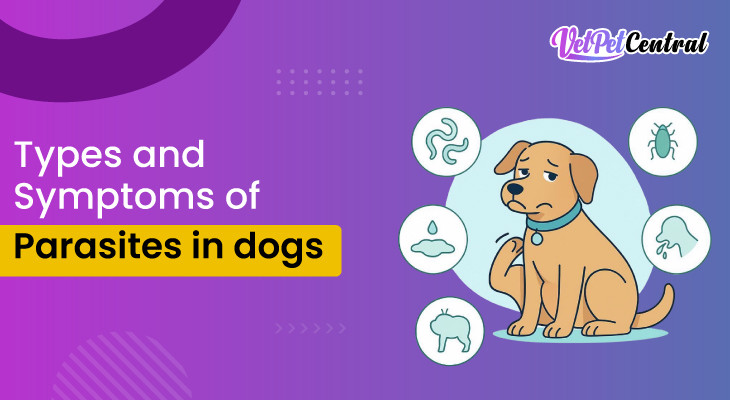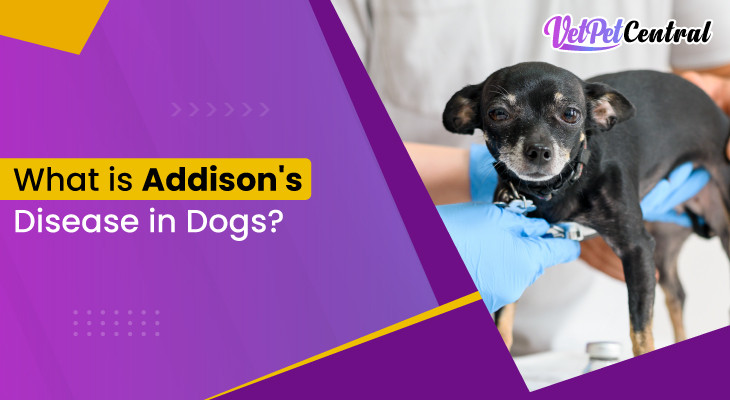Types and Symptoms of Parasites In Dogs
 Jun 23, 2025
Jun 23, 2025

Intestinal parasites are more common in dogs than many pet owners realize. According to estimates from Kansas State University’s Veterinary Health Center, approximately 34% of dogs in the United States are affected by intestinal parasites. Even more concerning, puppies under 6 months of age have an infection rate of nearly 50% (PubMed)
These statistics reflect the vulnerability of our canine companions to intestinal parasites. To protect your beloved pets, it’s essential to learn about this disease, which includes the symptoms of parasites in dogs, their treatment options, and more.
In this blog, we’ve discussed everything about intestinal parasites. You will find all the information you need to keep your dogs safe from this disease, from causes to treatment options.
So, let’s begin!
Overview of Intestinal Parasites in Dogs
Dogs can ingest intestinal parasites or their eggs by taking contaminated food or water. These tiny living organisms start residing in dogs' digestive tracts and feeding on their nutrients, leading to serious health concerns.
Types and Symptoms of Parasites In Dogs
There are numerous types of intestinal parasites in dogs; each affects the dog’s digestive system in multiple ways. The most common types include the following:
1. Roundworms
Roundworms, including Toxocara canis and Toxascaris Leonina, are the most common parasites in dogs.
Roundworms have long and slender bodies of white or light brown color. They can lead to malnutrition and weight loss in dogs.
In addition, roundworms are easily transmitted to humans.
So, taking precautions is important when dealing with a pet patient suffering from this specific intestinal disease.
2. Tapeworms
Tapeworms live in the small intestines of dogs and can lead to:
- Vomiting
- Diarrhea
- Weight loss
These small, flatworms can be transmitted when pets eat fleas or other insects. The common types of tapeworms are :
- Dipylidium caninum
- Taenia species
- Echinococcus species
3. Hookworms
As the name suggests, these worms have hook-like shapes that typically stick to the lining of the small intestine.
They can cause weight loss and anemia and can be easily transmitted to human bodies, including their most common types:
- Ancylostoma caninum
- Ancylostoma Braziliense
4. Whipworms
These are whip-shaped worms that reside in the large intestines of dogs. These types of worms aren’t as common as the above parasites.
However, if not treated on time with effective treatment options, they can lead to serious health concerns like:
- Weight loss
- Diarrhea
- Bloody stools
5. Giardia
This is a microscopic and single-celled parasite that can be ingested when the dog comes in contact with the contaminated feces of infected dogs.
The symptoms of intestinal parasites in dogs include:
- Vomiting
- Diarrhea
- Lethargy
- Weight loss
6. Coccidia
This type of parasite has only one cell and typically affects pet patients with weak immune systems.
Coccidia can cause:
- Weight loss
- Diarrhea
- Vomiting
Different Methods to Treat Parasites in Dogs
The most effective method for treating parasites is deworming (under the supervision of a licensed veterinarian).
These medications can be in the form of pills or liquids. The medication and length of the course depend on the type of parasite and its severity. Apart from this, maintaining a balanced diet that is rich in nutrients is essential for enhancing gut health.
Veterinarians recommend adding fiber-rich food to the dog’s diet to prevent parasite growth.
Wrapping Up!
Symptoms of parasites in dogs, including vomiting, weight loss, and bloody stools, shouldn’t be ignored. On noticing any of these symptoms, immediately address a licensed veterinarian. Remember, if not treated on time, intestinal parasites in dogs can lead to serious health issues.
Explore VetPet Central to get immediate consultation. We offer 24/7 telemedicine services and connect you with nearby licensed veterinarians. You can easily schedule an appointment online to get a treatment plan for parasites in dogs.
FAQs
How do you treat intestinal parasites in dogs with natural remedies?
Natural foods that are rich in fiber can enhance your dog’s gut health and prevent intestinal diseases. Foods like pumpkin seeds can help in naturally treating parasites in dogs.
Is Flagyl used for parasites?
Yes, Flagyl is used to treat giardia, a specific type of intestinal parasite in dogs. However, the medicine isn’t effective in treating all types of parasites in dogs. Make sure to consult a veterinarian before giving Flagyl to your dog.
Can antibiotics kill parasites in dogs?
Yes, specific antibiotics can kill intestinal parasites in dogs. It’s important to consult a veterinarian to diagnose the underlying issue and get a prescription based on the type of worms.




